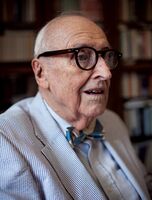William Theodore de Bary
| PersonType | Category:Authors of English Works Category:Editors Category:Professors |
|---|---|
| FirstName / namefirst | William Theodore |
| LastName / namelast | de Bary |
| namemiddle | Theodore |
| MainNamePhon | William Theodore de Bary |
| bio | William Theodore de Bary (Chinese: 狄培理; pinyin: Dí Péilǐ; August 9, 1919 – July 14, 2017) was an American Sinologist and scholar of East Asian philosophy who was a professor and administrator at Columbia University for nearly 70 years.
De Bary graduated from Columbia College in 1941, where he was a student in the first year of Columbia's famed Literature Humanities course. He then briefly took up graduate studies at Harvard University before leaving to serve in American military intelligence in the Pacific Theatre of World War Two. Upon his return, he resumed his studies at Columbia, where he completed his Ph.D. in 1953. In order to create text books for the non-Western version of the Columbia humanities course, he drew together teams of scholars to translate original source material, Sources of Chinese Tradition (1960), Sources of Japanese Tradition, and Sources of Indian Tradition. His extensive publications made the case for the universality of Asian values and a tradition of democratic values in Confucianism. He is recognized as training the graduate students and mentoring the scholars who created the field of Neo-Confucian studies. (Source Accessed July 18, 2023) |
| YearBirth | 1919 |
| YearDeath | 2017 |
| Other wikis |
If the page does not yet exist on the remote wiki, you can paste the tag |

